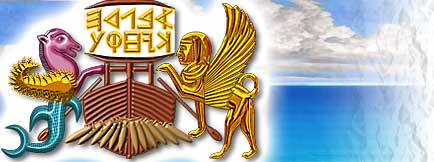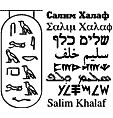Phoenician Punic Translation of the Bible (Punic Bible - link)
Sister Cities: Cadiz, Spain, Puerto Vallarta, Mexico & the Phoenician Exhibition (Sister Cities Exhibition - link)
Oldest Hebrew and Samaritan Script and Language were nothing but Phoenician (Old Hebrew is Phoenician - link)
Connection between the Phoenicians and the Irish-Celtic (Phoenicians and Irish - link)
Study on skeletal remains in Cadiz proves their Phoenician origin
(Phoenicians of Cadiz - link)
Cadmus Slays The Serpent (Cadmus and the Serpent - links)
Rediscovering Ancient Phoenicia: The Truth Behind Phoenician Identity in the Mediterranean (Rediscovering - links)
Journey to the Mythological Inferno and Chavín's Labyrinth and the Palace of Hades and Persephone (News Release & Articles - links)
New Tower to Obliterate Phoenician Port in Menit El-Hosn [Port of the Fort] in Beirut (Port - link)
The discovery of the raampa pictographic writing in the Senegambia, West Africa, and its relation to Phoenician (Pictographs - link)
La película documental sobre la aportes del Líbano a la civilización (Documentary movie link - Movie about the contribution of the Lebanon to world civilization in Spanish)
The Abdallah Zakhir Museum, maker of the first Arabic press in the Middle East. (Zakhir link - update)
The Sabaeans had an advanced culture of their own and were not Arabs. (Sabaeans link - update)
Phoenician Commerce (Commerce link)
North African Lanugages, More than Meets the Ear (Opinion — Tibune Libre link)
Itureans were not Arabs, and Biblical Myths impact history (Itureans link)
Pythagoras page update: prseentation by NDU students (Pythagoras link)
Open Letters from the public to the media (Open Letters link)
Phoenician from the Ashes excavations in South Lebanon (Ashes link)
UPDATE: Proving History Through Science -- National Geographic studies Phoenician DNA in Lebanon & Phoenician settlements with interview with Dr. Pierre Zalloua from YouTube (National Geographic link)
Certaines publications sur le sujet des Phéniciens en français par le Dr Clovis Y Karam (Karam link in French)
Orthodox Patriarchate of Antioch Union Conception (Orthodox Antioch link) Greek Melkite Patriarchate of Antioch (Greek Melkite link)
Byzantine Emperor who was one of us (Leo III link)
History of the early chuch (Church of Phoenicia & Antioch link)
Crusader & Arab DNA among the Lebanese?(Living Phoenicians link) & The
Lebanese- Phoenicians are from Lebanon- Phoenicia (Lebanese
Phoenicians link)
Byblos priests' snake spells to protect pharaoh's mummy, oldest Semitic text of 3,000 BC (Snake Spells)
Origin of the Arts and Philosophy were non-Greeks (non-Greek Origins)
Phoenician Music and Hymn to the Moon Goddess Nikhal Interpreted from Cuneiform Tablets (Music)
The Carthaginians Did Not Sacrifice Children: Excavations in Zama {Child Sacrifice)
Souk El-Gharb and Bmakine, My Intertwined Hometowns (Souk El-Gharb or Bmakine)
The Amazigh (Berber), their language and alphabet (Berber)
Miraculous Icon of Berytus (Beirut) and the Statue of Christ in Caesarea (Berytus Icon)
Zachariah of Mitylene, Syriac Chronicle, major anti-Chalcedonian source (Syriac Chronicle) & Writings of the Syriac Church Fathers by Mar Abd Yeshua A.D. 1298. (Syriac Writers link) &History of the Christian Syriac Schools of Theology -- the Syriac Christian learning environment (Syriac Schools link)
The Phoenicians in West Africa – Ajahi to Ajahi (West Africa link) & The Phoenicians in West Europe: From Canaan to Cornwall (Cornwall link) & The Phoenicians and the West -- book review (The West link)
"Aramaic of Jesus & Phoenician influence on Ancient Hebrew (Aramaic of Jesus link)
The Arms and Armor of The Punic Phoenicians (Arms Armor link)
Plato's Atlantis and The Kings of Atlantis, Gods of the Phoenicians (Plato link)
Palestinian Christians: plight of the original Christians of the Holy Land. (Palestine Christians link)
The Phoenicians and Their Origins migration of the human race out of Africa (Migration link)
The Falsehood of Pan-Arabism (Pan-Arabism link)
Online English to Phoenician Dictionary(Phoenician Dictionary link)
Were the Phoenicians Related to the Hittites? -- (Hittite-Phoenicians link)
Assemani, Maronite Light from the East for the Church and the World -- (Assemani link)
Ahiram, the King's Coronation March -- My pipe organ musical composition (Coronation link)
Phoenicians of Malta and their Language. -- A genetic study of modern Maltese proves that half of them carry Phoenician genetic identifiers. (Malta link)
The Amorites and the Canaanite Phoenicians were not the same people. -- (Amorites link)
The concept of time -- Secret Works of the Phoenicians (Time link) & Phoenician
Theology the oldest archive of the Western World (Theology link). The God-Idea of the Phoenicians (Theogony link)
Translation of the Gospel of Saint John into Lebanese -- project to translate the whole Bible into Lebanese (Gospel of John link)
The difference
between the Arabic Language and the Lebanese language, the importance of distinguishing (Lebanese
Language link)
Chart of the
Syro-Phoenician Church from 525 A.D. till 1724, Eastern
Christian Milestones (Christian
Milestones link)
Origin of the Phoenician Empire -- Accurately Dating Phoenician History, presented at the
Annual Conference of World History Association (Chronology link)
In Honorem:
Deacon Abdalla Zakhir, the first Arabic script press (Arab Press or Zakhir link)
The
Incomparable Hannibal —-- A Personal View by Dennis
Price (Hannibal link)
What was Historical Syria and Phoenicia? Is there confusion? (Syria link)
Did the Phoenicians Introduce the Idea of Interest to Greece & Italy; if so When? (Debt-Interest link); & "City-specific coins" coinage (Money link)
Elissar, Dido, Queen of Carthage and her “shining city” (Elissar link); & Jezebel, Phoenician Queen of Israel. (Jezebel link)
Tertullian
of Carthage, Early Church Father (Tertullian link); & Phoenician & Popes Phoenician Saint Augustine of Hippo ("Popes" & "Augustine" links left); & Saint Cyprian of Carthage, Bishop and Martyr (Cyprian link)
"In
Perpetuum Honorum" to Emir (Prince) Maurice Chehab for saving treasures of the Lebanese
National Museum. (Honorum link)
Chants honoring
Lebanese archbishops today
proclaim them "Metropolitan Archbishops
of Phoenicia Maritima." (Metropolitan link)
History
of the Syriac Orthodox Church (Syriacs links); Byzantines of the East, the Melkites ("Melkites" link) & the Maronites and Lebanon, A Brief History, Eastern Christians are living repositories of culture. (Maronites link)
Hall
of Maps and Marinus of Tyre, Mathematical Cartographer (Maps or Marinus links)




 or
their descendent in the modern world. They assume such a mention
has political and religious overtones. However, Phoenician blood
runs through their own veins themselves and most people in the region
-- Phoenician does not mean Maronite
Christian only, something which nobody claims but which Arabists
assume. Further, there is no reason for those aforementioned who
suffer from this Phoenician Complex to deny their heritage.
Such people have no shame and are fools to ignore their great heritage.
Many other people from the Lebanon, Levant and western Mediterranean, including European and
North African Muslim, Arab countries proudly accept Phoenician as
their heritage and ancestry. (my witnesses testify to this effect on the
or
their descendent in the modern world. They assume such a mention
has political and religious overtones. However, Phoenician blood
runs through their own veins themselves and most people in the region
-- Phoenician does not mean Maronite
Christian only, something which nobody claims but which Arabists
assume. Further, there is no reason for those aforementioned who
suffer from this Phoenician Complex to deny their heritage.
Such people have no shame and are fools to ignore their great heritage.
Many other people from the Lebanon, Levant and western Mediterranean, including European and
North African Muslim, Arab countries proudly accept Phoenician as
their heritage and ancestry. (my witnesses testify to this effect on the 

